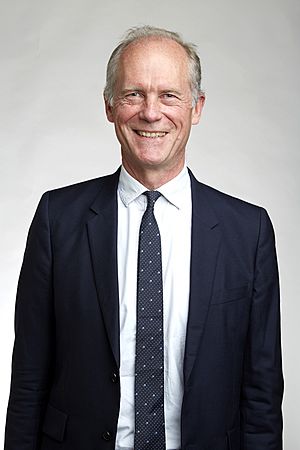Dimitri Kullmann facts for kids
Quick facts for kids
Dimitri Kullmann
FRS FMedSci MAE
|
|
|---|---|

Kullmann in 2018
|
|
| Born |
Dimitri Michael Kullmann
1958 (age 67–68) London, England
|
| Education | Lycée Français Charles de Gaulle |
| Alma mater | University of Oxford |
| Awards | Baly Medal (2017) |
| Scientific career | |
| Fields |
|
| Institutions |
|
| Thesis | Central actions of muscle receptors (1984) |
| Doctoral advisor | Julian Jack |
Dimitri Michael Kullmann, born in 1958, is a British doctor who specializes in the brain and nervous system. He is a professor of neurology at the UCL Institute of Neurology at University College London (UCL). Professor Kullmann also leads a special project called the "synaptopathies initiative." This project studies how problems with brain connections can cause diseases. He also works as a consultant neurologist at the National Hospital for Neurology and Neurosurgery.
Contents
Studying the Brain
Dimitri Kullmann went to school in London, England. He studied how the body works (called physiology) at University of Oxford. There, he earned his first degree and later a higher degree called a Doctor of Philosophy. He also trained at St Thomas's Hospital Medical School in London. His advanced research was guided by a scientist named Julian Jack.
Brain Research and Career
Professor Kullmann's research focuses on how brain cells talk to each other. This communication happens at tiny connections called synapses. He studies how these synapses work when we are healthy and what goes wrong when we get sick.
How Brain Cells Talk
His lab has helped us understand how special chemicals, called neurotransmitters, send messages between brain cells. They also figured out how these messages change the strength of connections over time. This is important for learning and memory.
Understanding Brain Diseases
Professor Kullmann's team looks at genetic problems or immune system issues that affect synaptic proteins. These problems are called "synaptopathies." By studying them, scientists can learn more about many brain diseases. These include conditions like epilepsy and migraine.
New Treatments for Epilepsy
Working with his colleagues, Professor Kullmann has used these discoveries to create new ways to treat severe epilepsy. They are exploring gene therapy strategies. This involves changing genes to help fix the brain's connections.
Key Discoveries
Professor Kullmann's lab has made many important discoveries. They helped find "silent synapses," which are connections that are not active until needed. They also studied how chemicals can "spill over" from one synapse to another. Other discoveries include:
- How some brain cells (interneurons) can strengthen their connections.
- Problems with channels in brain cells, called neurological channelopathies.
- How brain waves (neural oscillations) work.
Before working at UCL, he did research with Roger Nicoll at the University of California, San Francisco.
Awards and Honours
Professor Kullmann has received many awards for his important work.
- In 1986, he won the University Gold Medal in Medicine from the University of London.
- In 2017, he was given the Baly Medal by the Royal College of Physicians.
- He was elected a Fellow of the Academy of Medical Sciences in 2001.
- In 2018, he became a Fellow of the Royal Society. This is a very high honour for scientists in the UK.
- In 2023, he received the Basic Science Research Award from the American Epilepsy Society.
 | Janet Taylor Pickett |
 | Synthia Saint James |
 | Howardena Pindell |
 | Faith Ringgold |

